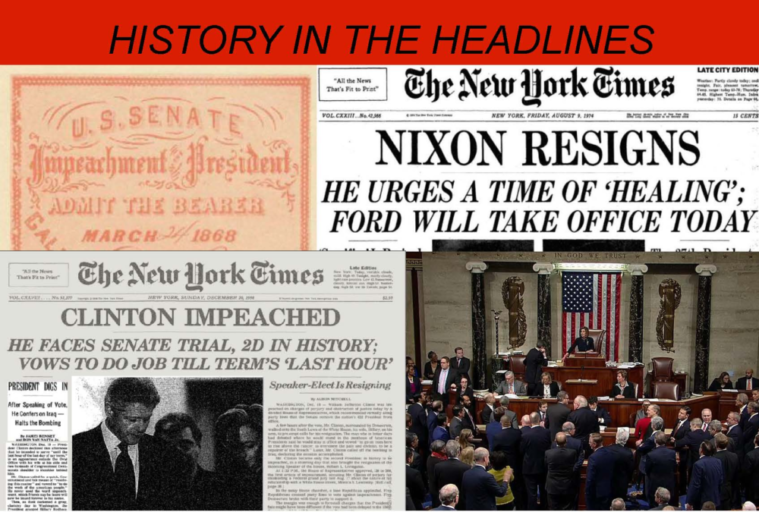
Written by Will Lighthart ’21, History major
On January 22, 2020, the History Department hosted a History in the Headlines event about The History & Politics of Impeachment. The roundtable discussion with Q&A featured Professors Carla Bittel and Sean Dempsey from the History Department, Professor Richard Fox from the Political Science Department, and Professor Jessica Levinson from Loyola Law School.
Professor Bittel spoke on the impeachment proceedings of President Johnson in 1868. Professor Bittel shed light on the basis for Johnson’s impeachment, which was supposedly over a breach of tenure of office. She explained that the true motive behind the impeachment was Johnson’s position on race, specifically his veto of a civil rights act, pardoning of Confederate criminals, and indifference to the violence towards former slaves.
Another LMU historian, Professor Dempsey, offered context and analysis for the impeachment circumstances and procedures during the Clinton and Nixon administrations. Clinton, with whom the public sympathized during the impeachment process, was able to benefit despite being impeached. This was illustrated by the surge in Democratic support in the midterm elections following the impeachment. Dempsey noted that in the case of Nixon, the Watergate scandal was followed by Senate hearings, as well as House, Senate, and special counselor investigations, which parallel the investigations of Trump. But in the case of Nixon, Republican senators approached Nixon to warn him that he would be impeached and convicted; Nixon resigned instead.
Professor Levinson spoke on the constitutional basis for impeachment. Levinson began by explaining that impeachment is a political process and not a legal process, by nature. This distinction is because impeachment is conducted in the Senate, not a court of law, and the side with the most evidence does not always win in an impeachment. Levinson also pointed out the Constitution provides no detailed instruction for what qualifies as an impeachable offense. This absence in guidance and requirements for House/Senate procedure provides flexibility and room to grow as times change.
Professor Fox discussed the political implications of past impeachments, as well as the ongoing impeachment of President Trump. Fox noted there is little dispute over whether Trump actually played a role in withholding aid. The true dispute is as to whether Trump’s actions qualify as high crimes and misdemeanors. During this impeachment, Republicans are under pressure to defend Trump, the current figurehead of their party, and secure their party’s favor with voters in the upcoming State of the Union address and 2020 election. Trump’s impeachment is part of continued polarization that is leading, according to Fox, to the most polarized times since the Civil War. Fox’s ending sentiment was that Trump could benefit during the next election cycle if the public perception of the impeachment is sympathetic towards Trump, as it was for Clinton.



